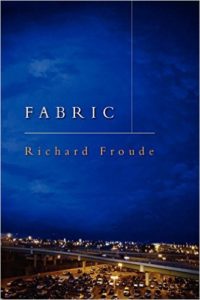Fabric
 by Richard Froude,
by Richard Froude,
Horse Less Press, 2011,
120 pages, paper, $15.00,
ISBN: 978-0-982989-60-9
Buy the Book
“Yesterday, aged 29, I bought a dustbuster.” Such declarative sentences fill Richard Froude’s Fabric. The “I” of the book is a likable fellow who buys dustbusters, likes a good wheeze (albeit while staying up all night rewriting the dictionary), and likes to eat cold grilled chicken from Ziploc ® bags. He possesses a willingness to participate that beguiles the theoretical complexities that vie for supremacy in this hybrid of poetry /fiction /memoir.
At first glance, the book is arranged in prose chunks, possibly termed poems, that each take up roughly a half page. A reader may smell poetry leaking through the pages, but Froude shies away from such a moniker: “The word ‘poet’ makes me uncomfortable.” And one sympathizes with him, as Poets come to mind, dressed in all black with well – placed berets atop boozy breath.
In fact, Froude shies away from most gestures of qualification, but he does so in a paradoxical way. His quick, direct sentences give a reader the sense that he is telling straight facts, but this definitiveness quickly undefines itself as a reader realizes that what Froude is saying is anything but explanatory. Froude mentions that “fiction is revealed to be the most popular form of immortality.” So perhaps there is an element of ambition, of immortality here (can it ever be very far absent from any writer ? ), but Froude immediately follows this statement with: “I don’t think I’m going to explain this any further.” It is this theoretical push, and then quick retreat, that characterizes much of the book, and one almost begins to feel that Froude is too modest to fully explain himself, or even to fully acknowledge the ambition of the book. He is even more likable as an author because of this modesty, which feels genuine as opposed to a false – bred modesty.
The book is really a book of transitions. How a reader is able to experience and follow these transitions determines the level of enjoyment extracted from the book. They are quick turns, fast theoretical yanks of the wheel to accommodate such drivers as Deleuze, Jabes, and Barthes, and to be honest, I didn’t follow all of them. But that’s not so surprising; I rarely ever manage to do this. As a reader, I sometimes feel my driving /reading skills are more attuned with my inner grandmother, who perpetually drives ten miles below the speed limit. But this did not inhibit my reading pleasure of Fabric. And in fact, Froude at one point says: “I do not understand the transition. I hold you until you disappear.” It’s a pleasurable, if fleeting, embrace.
Some of these transitions are more successful than others. From page 33 to 34, Froude elegantly moves from a beautiful poetic sequence about constellations, blood and cities into an anecdote, on page 34, about a family trip to Orlando and on to the invention of the stadium wave (I told you the transitions were fast). However, on page 35, two prose sections are linked by the clunky transitional phrase, “That is,” signifying to this reader that this particular turn felt a little forced. In a book with so many fast turns, a few slack ones only feel inevitable.
In order to really appreciate the denseness of Fabric, a reader must have a certain postmodern / New Prose appetite for theoretical acrobatics that can, at times, feel like they exist for their own sake. I enjoyed Froude’s anecdotes over his aphorisms, small narratives about Jackie Robinson’s rookie card or the detonation of the 29 – kiloton nuclear device named “Apple II.” It is a heady mix of trivia and history mixed with a high – pedigree of abstract poetics.
Towards the end of a piece about Richard Brautigan’s A Confederate General from Big Sur, Froude mentions Erik Satie: “reading (as well as writing) can exist as a practice of measurement.” This feels appropriate for Fabric as well. There is an exactness to Froude’s exploration, a writer’s scientific reveling in history’s ephemera. One constructs an image of the author joyfully sifting through the spilled contents of an enormous Ziploc ® bag that had contained not cold grilled chicken, but fact after theory after fact, and all of it awaiting the dustbuster of his pen.
— Jefferson Navicky

